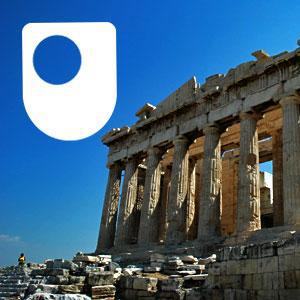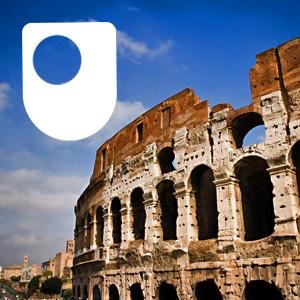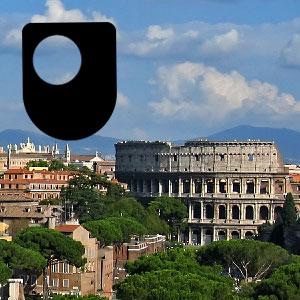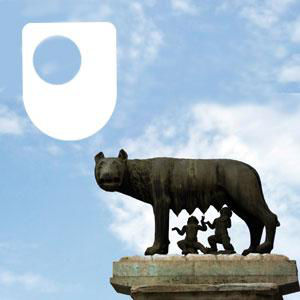
Epics of Rome
This subject explores Ancient Roman epic poetry, the literary genre which deals with grand mythical narratives involving heroes, gods, war, and love affairs.
- 44 minutes 10 secondsAfterlife II: The Novel
The Aeneid and Metamorphoses have continued to be rediscovered and reinterpreted throughout the 20th and 21st centuries. The two world wars which defined the first half of the 20th century forced a reconsideration of all war poetry, particularly the Aeneid, which began to be recognised as a work of art which dealt with loss and lament just as much as glory and patriotism - a work which potentially questioned militarism and imperialism. Meanwhile Ovid's explorations of love, desire and identity chimed with the development of psychoanalysis, while his apparently chaotic epic became a major focus of interest later in the 20th century as post-modernism championed non-linear narratives and questioned the permanence of boundaries. Again, it was Ovid in particular who provided the springboard for many new texts, particularly the short story, which often resulted in dramatically diverse updates of the stories in the Metamorphoses.
Copyright 2014 Rhiannon Evans / La Trobe University, all rights reserved. Contact for permissions.
27 May 2014, 3:10 am - Afterlife II: The Novel (handout)
The Aeneid and Metamorphoses have continued to be rediscovered and reinterpreted throughout the 20th and 21st centuries. The two world wars which defined the first half of the 20th century forced a reconsideration of all war poetry, particularly the Aeneid, which began to be recognised as a work of art which dealt with loss and lament just as much as glory and patriotism - a work which potentially questioned militarism and imperialism. Meanwhile Ovid's explorations of love, desire and identity chimed with the development of psychoanalysis, while his apparently chaotic epic became a major focus of interest later in the 20th century as post-modernism championed non-linear narratives and questioned the permanence of boundaries. Again, it was Ovid in particular who provided the springboard for many new texts, particularly the short story, which often resulted in dramatically diverse updates of the stories in the Metamorphoses.
Copyright 2014 Rhiannon Evans / La Trobe University, all rights reserved. Contact for permissions.
27 May 2014, 3:06 am - 38 minutes 9 secondsAfterlife I: Late Latin and Renaissance
Virgil and Ovid were both incredibly influential upon later poetry and culture, and in this lecture we look at some of the texts which look back to their epics in the late antique period through to the Renaissance, in particular Claudian's Rape of Proserpina and Shakespeare's poetry and drama, as well as other creative arts. By looking at the reception of Roman epic we gain some perspective on these ancient works and can appreciate how they were read and interpreted by their European cultural inheritors.
Copyright 2014 Rhiannon Evans / La Trobe University, all rights reserved. Contact for permissions.
21 May 2014, 12:21 am - Afterlife I: Late Latin and Renaissance (handout)
Virgil and Ovid were both incredibly influential upon later poetry and culture, and in this lecture we look at some of the texts which look back to their epics in the late antique period through to the Renaissance, in particular Claudian's Rape of Proserpina and Shakespeare's poetry and drama, as well as other creative arts. By looking at the reception of Roman epic we gain some perspective on these ancient works and can appreciate how they were read and interpreted by their European cultural inheritors.
Copyright 2014 Rhiannon Evans / La Trobe University, all rights reserved. Contact for permissions.
21 May 2014, 12:18 am - 50 minutes 37 seconds'I shall live': Immortality
Ovid ends his work with a series of deifications: Julius Caesar becomes a god; Augustus will become a god. This most allusive and transformative of texts apparently ends with a pat celebration of the Julian family. However, this is not the end at all, for Ovid actually completes his work with his own immortality: he will live through his work and thus go beyond death and also beyond the holders of political power. It is a confident statement of the transcendence of poetry. Yet nothing is stable in Ovid's world, and the final book also contains a lengthy speech by the philosopher Pythagoras, whose beliefs include the perpetual rebirth of souls into new bodies. Is this an attempt to give a theoretical underpinning to the epic? Or does it once again snatch the rug from under the reader's feet?!
Copyright 2014 Rhiannon Evans / La Trobe University, all rights reserved. Contact for permissions.
14 May 2014, 12:08 am - 'I shall live': Immortality (handout)
Ovid ends his work with a series of deifications: Julius Caesar becomes a god; Augustus will become a god. This most allusive and transformative of texts apparently ends with a pat celebration of the Julian family. However, this is not the end at all, for Ovid actually completes his work with his own immortality: he will live through his work and thus go beyond death and also beyond the holders of political power. It is a confident statement of the transcendence of poetry. Yet nothing is stable in Ovid's world, and the final book also contains a lengthy speech by the philosopher Pythagoras, whose beliefs include the perpetual rebirth of souls into new bodies. Is this an attempt to give a theoretical underpinning to the epic? Or does it once again snatch the rug from under the reader's feet?!
Copyright 2014 Rhiannon Evans / La Trobe University, all rights reserved. Contact for permissions.
14 May 2014, 12:07 am - 53 minutes 28 secondsAeneid again? Troy and Rome
In books 11-14 of the Metamorphoses Ovid takes on the stories of Troy's fall and Rome's origin - have we finally reached the point of 'real epic'? In fact, Ovid's approach is very different from Virgil's in the Aeneid, and tends to focus on characters tangential to the canonical Virgilian and Homeric versions. There are also long diversions as characters from the Trojan War narrate non-military tales, with the result that Troy's destruction and Rome's foundation are told in a non-linear fashion. This lecture will explore Ovid's narrative strategy in these later books, and investigate the political and poetic effect of this Callimachean alternative to Roman foundation myth.
Copyright 2014 Rhiannon Evans / La Trobe University, all rights reserved. Contact for permissions.
7 May 2014, 2:11 am - Aeneid again? Troy and Rome (handout)
In books 11-14 of the Metamorphoses Ovid takes on the stories of Troy's fall and Rome's origin - have we finally reached the point of 'real epic'? In fact, Ovid's approach is very different from Virgil's in the Aeneid, and tends to focus on characters tangential to the canonical Virgilian and Homeric versions. There are also long diversions as characters from the Trojan War narrate non-military tales, with the result that Troy's destruction and Rome's foundation are told in a non-linear fashion. This lecture will explore Ovid's narrative strategy in these later books, and investigate the political and poetic effect of this Callimachean alternative to Roman foundation myth.
Copyright 2014 Rhiannon Evans / La Trobe University, all rights reserved. Contact for permissions.
7 May 2014, 2:10 am - 45 minutes 21 secondsArt and Song: Orpheus and Pygmalion
This lecture focusses on the two most prominent lovers in Metamorphoses 9-11, Orpheus and Pygmalion. Both also happen to be artists. We first examine Orpheus, paying particular attention to the ways in which Ovid reworks the Virgilian account in Georgics 4, and then Pygmalion, concentrating on the nature of his passion and the connections between the sculptor and the internal narrator who tells his story. We conclude with reflections on the implications of these stories for our understanding of Ovid’s representation of artists in Metamorphoses.
Copyright 2014 Rhiannon Evans / La Trobe University, all rights reserved. Contact for permissions.
2 May 2014, 2:03 am - 51 minutes 27 secondsChanging Nature: Genre in the Metamorphoses
It is often said that Ovid's is a 'Callimachean epic', in other words an episodic and aetiological poem which eschews big scale narratives. As we are now tow thirds of the way through this poem, it is worth considering the degree to which the Metamorphoses 'plays by the rules' of epic poetry. In this lecture we consider the techniques and conventions which place this poem in the epic genre - particularly the scenes of battle or conflict; as well as the literary techniques which mark this poem as a hybrid or parodic epic.
Copyright 2014 Rhiannon Evans / La Trobe University, all rights reserved. Contact for permissions.
15 April 2014, 1:33 am - Changing Nature: Genre in the Metamorphoses (handout)
It is often said that Ovid's is a 'Callimachean epic', in other words an episodic and aetiological poem which eschews big scale narratives. As we are now tow thirds of the way through this poem, it is worth considering the degree to which the Metamorphoses 'plays by the rules' of epic poetry. In this lecture we consider the techniques and conventions which place this poem in the epic genre - particularly the scenes of battle or conflict; as well as the literary techniques which mark this poem as a hybrid or parodic epic.
Copyright 2014 Rhiannon Evans / La Trobe University, all rights reserved. Contact for permissions.
15 April 2014, 1:32 am - More Episodes? Get the App
Your feedback is valuable to us. Should you encounter any bugs, glitches, lack of functionality or other problems, please email us on [email protected] or join Moon.FM Telegram Group where you can talk directly to the dev team who are happy to answer any queries.
 Exploring the classical world - Audio
Exploring the classical world - Audio
 Imperial Rome and Ostia - for iPod/iPhone
Imperial Rome and Ostia - for iPod/iPhone
 Buildings of ancient Rome - for iPod/iPhone
Buildings of ancient Rome - for iPod/iPhone
 Power and people in ancient Rome - for iPod/iPhone
Power and people in ancient Rome - for iPod/iPhone
 Myth at the heart of the Roman Empire - for iPod/iPhone
Myth at the heart of the Roman Empire - for iPod/iPhone